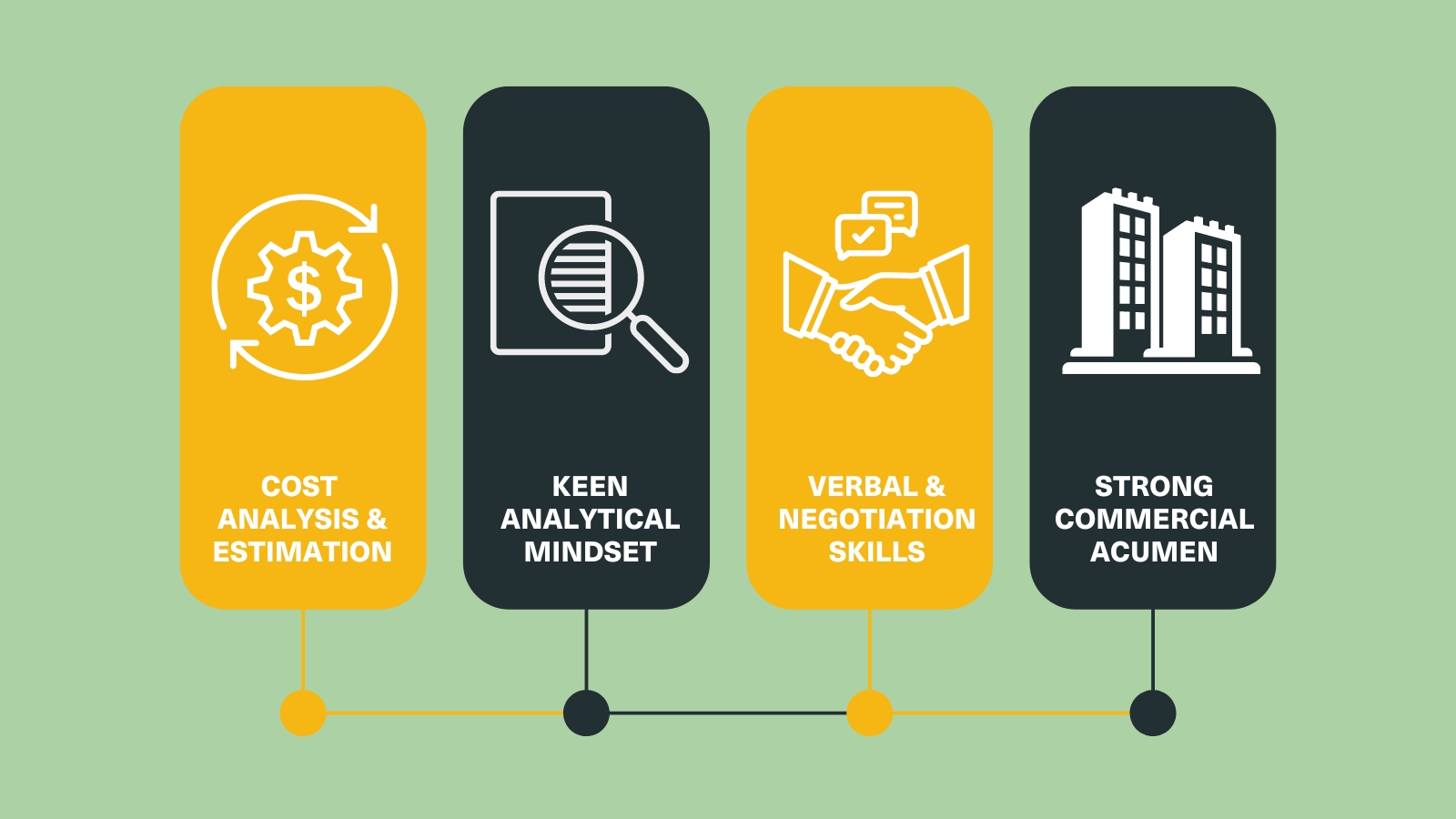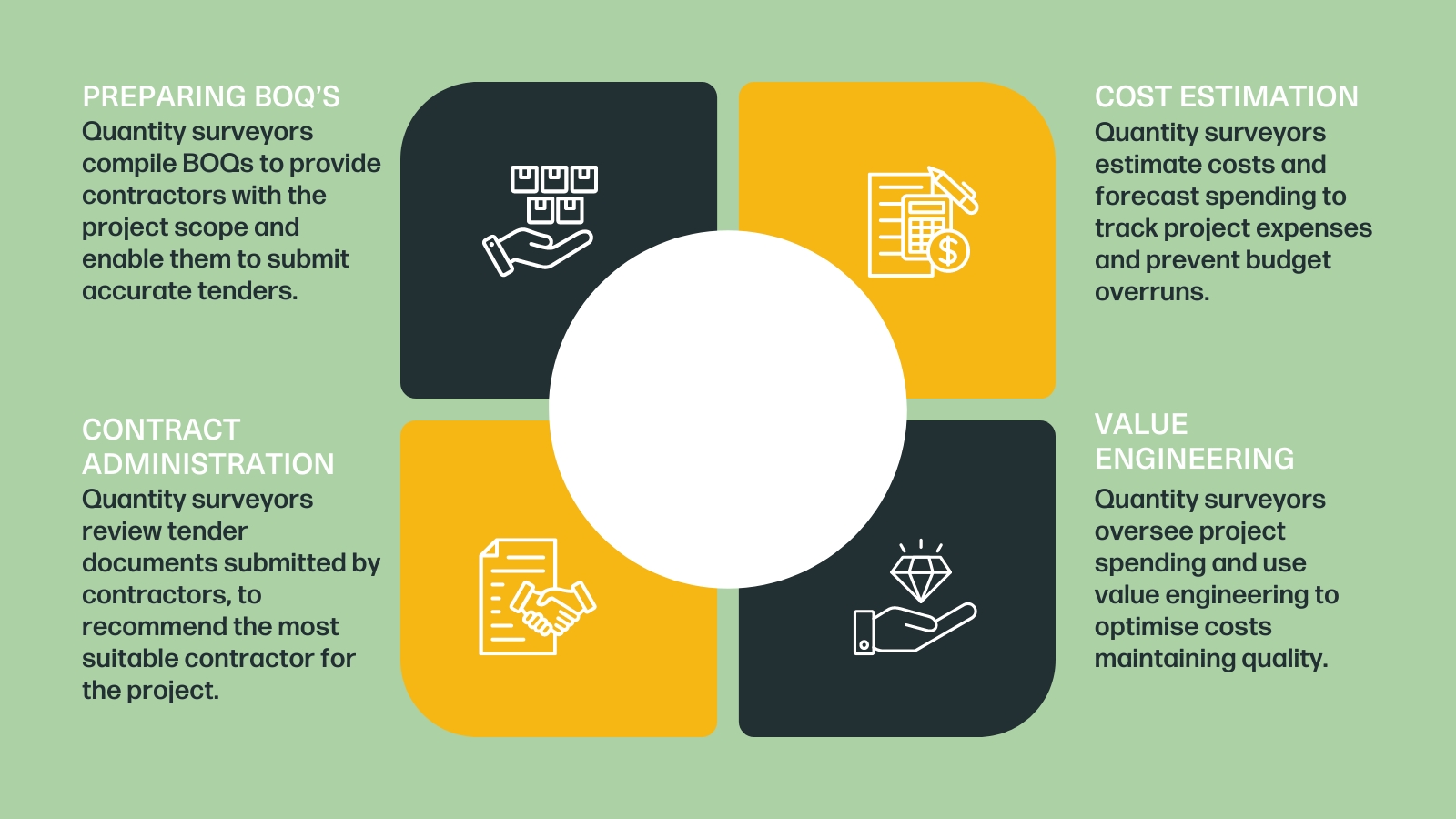Have you ever wondered how grand structures rise from blueprints to become functional buildings? Quantity surveyors play a vital role in making this happen.
The construction industry is a complex and ever-evolving sector, and quantity surveyors are the financial guardians who ensure projects are delivered on time, within budget, and to the required quality standards. According to the Royal Institution of Chartered Surveyors (RICS), the quantity surveying profession offers a rewarding career path.
This blog post delves into the essential skills and responsibilities of a quantity surveyor, equipping you for a thriving career in this dynamic field.
What are the Essential Skills Required for a Quantity Surveyor?
- Cost Analysis: Quantity surveyors are cost management experts. They analyse project plans and blueprints to estimate the materials, labour, equipment, and other associated costs involved in a construction project. Their ability to generate highly accurate estimates is fundamental to securing project funding and ensuring financial viability.
- Analytical Mindset: A keen analytical mind is a cornerstone of success in quantity surveying. Quantity surveyors must be able to dissect complex projects, identify potential risks and opportunities, and develop practical solutions to keep projects on track.
- Communication Skills: Collaboration is key in construction projects, and quantity surveyors need excellent communication skills to liaise effectively with architects, engineers, contractors, and clients. This includes clear written and verbal communication to explain complex cost estimates, negotiate contracts, and resolve disputes.
- Attention to Detail: Quantity surveying demands meticulous attention to detail. Even minor errors in cost calculations can have a significant impact on project budgets. A keen eye for detail ensures accuracy in bills of quantities (BOQs) and other cost-related documents.
- Technical Skills: Software proficiency is a must-have for quantity surveyors in today's digital age. They leverage specialised software for cost estimating, project management, and building information modelling (BIM) to streamline workflows and enhance project delivery.
- Commercial Acumen: A strong understanding of commercial principles is advantageous for quantity surveyors. This includes knowledge of contract law, procurement methods, and risk management strategies, enabling them to navigate complex financial landscapes and safeguard project finances.

What are the Responsibilities of a Quantity Surveyor?
- Preparing Bills of Quantities (BOQs): BOQs are detailed lists of materials, labour, and equipment required for a project. Quantity surveyors compile BOQs to provide contractors with a clear understanding of the project scope and enable them to submit accurate tenders.
- Cost Estimating and Budgeting: Throughout the project lifecycle, quantity surveyors prepare cost estimates and forecasts to monitor project expenditures and identify potential cost overruns. They collaborate with project managers to develop realistic budgets and ensure projects remain financially viable.
- Contract Administration: Quantity surveyors play a pivotal role in contract administration. They draft tender documents, evaluate tenders submitted by contractors, and recommend the most suitable contractor for the project. Once contracts are awarded, they oversee contractual compliance and manage variations to the original scope of works.
- Cost Control and Value Engineering: Cost control is an ongoing process for quantity surveyors. They monitor project expenditures, identify areas for cost savings, and implement value engineering techniques to optimise project costs without compromising quality.

Job Market Outlook for Quantity Surveyors
The construction industry is expected to grow steadily in the coming years, driven by infrastructure projects and development. This growth will likely translate to an increased demand for qualified quantity surveyors. Internationally, the job outlook for quantity surveyors is positive.
But a looming skill gap also threatens the future of quantity surveying in the UK. A recent RICS Construction and Infrastructure Market Survey revealed that 66% of respondents reported shortages of quantity surveyors, with similar findings (54%) for other construction professionals. The situation is further compounded by the fact that roughly 30% of the profession is over 50 years old, highlighting the critical need to attract and retain top talent.
However, simply increasing the number of surveyors isn't enough. To reflect the realities of a 21st-century society, fostering diversity within the profession is essential.

Build a Rewarding Career: The Benefits of Becoming a Quantity Surveyor
The construction industry is a dynamic and ever-evolving sector globally, and quantity surveyors play a pivotal role in its success. But beyond the satisfaction of contributing to grand structures, a career in quantity surveying offers a multitude of benefits that transcend location:
- High Demand and Job Security: A looming skills gap is creating a surge in demand for qualified quantity surveyors worldwide. Recent RICS surveys reveal that a significant portion of the current workforce is nearing retirement age, further emphasising the need for new talent. This global demand translates to increased job security and ample career opportunities.
- Financially Rewarding: Quantity surveying is a well-respected profession with attractive salary prospects internationally. The median salary for a quantity surveyor can be quite competitive, making it a financially rewarding career choice no matter where you choose to work.
- Diverse and Stimulating Work: Quantity surveyors are involved in all project stages, from initial cost estimates to final budget control. This variety ensures a stimulating and intellectually challenging work environment, regardless of the specific project location. At Stonehaven, our experience and expertise cover a large variety of sectors from residential, hospitality, aviation, food and beverage, masterplans, etc.
- Excellent Career Progression: The quantity surveying profession offers clear pathways for career advancement globally. With experience and expertise, you can progress to leadership roles, specialise in specific areas, or even manage your own consultancy firm, opening doors to a fulfilling and successful career path.
- Global Opportunities: Quantity surveying skills are valuable worldwide. With the construction industry booming in many countries, a career in this field opens doors to exciting international opportunities. Your expertise could be sought after for projects across the globe, allowing you to travel and work in diverse locations.
- Making a Difference: Quantity surveyors play a crucial role in ensuring projects are delivered on time, within budget, and to the highest quality standards. This contributes to the successful development of essential infrastructure and buildings, ultimately impacting lives in positive ways, regardless of the geographical location of the project.
What Digital Skills Should Quantity Surveyors Learn?
In today's rapidly evolving digital landscape, quantity surveyors can greatly benefit from acquiring digital skills that complement their core competencies. Here are key digital skills that are increasingly valuable in the field:
- Building Information Modelling (BIM) Proficiency: Building Information Modelling (BIM) is revolutionising the construction industry by enabling collaborative and efficient project management. Quantity surveyors proficient in BIM can integrate cost estimation directly into the BIM model, improving accuracy and enabling real-time cost analysis throughout the project lifecycle. You can read more about the BIM’s role in project management on our recent article: Here
- Advanced Software Proficiency: Beyond BIM, proficiency in specialised software for cost estimating, project management and data analytics tools can significantly enhance productivity and decision-making. These tools streamline processes, improve accuracy in budgeting and forecasting, and facilitate better communication with project stakeholders.
- Data Analysis and Visualisation: Understanding and interpreting data is becoming increasingly crucial in quantity surveying. Skills in data analysis and visualisation allow surveyors to extract insights from project data, identify trends, and make informed decisions to optimise project costs and performance. Microsoft Excel and Power BI are important tools for data visualisation, reporting and seamless workflows.
- Digital Collaboration Tools: Effective communication and collaboration are essential in construction projects. Quantity surveyors should be adept at using digital collaboration tools such as Microsoft Teams, Slack, or project-specific platforms to facilitate seamless communication with architects, engineers, contractors, and clients, regardless of geographical locations.
- Cybersecurity Awareness: As digital tools become integral to daily operations, quantity surveyors must also be mindful of cybersecurity risks. Understanding cybersecurity best practices ensures the protection of sensitive project data and maintains the integrity of digital workflows.
- Continuous Learning and Adaptability: Given the rapid pace of technological advancement, quantity surveyors should cultivate a mindset of continuous learning and adaptability. Staying updated with industry trends and emerging technologies ensures relevance and competence in a digitally driven construction environment.

By integrating these digital skills with traditional quantity surveying expertise, professionals can not only meet current industry demands but also position themselves as invaluable assets in the future of construction project management. Embracing digital transformation empowers quantity surveyors to enhance efficiency, accuracy, and overall project success in today's competitive market.
Conclusion
A career in quantity surveying is an intellectually stimulating and financially rewarding path. By mastering the essential skills and responsibilities outlined above, you can position yourself for success in this lucrative and in-demand profession.
About us
Considering a project that requires meticulous cost management and financial expertise? Stonehaven offers comprehensive quantity surveying services to ensure your construction project stays on track and within budget.
Our team of experienced quantity surveyors can handle everything from initial cost estimates and BOQ preparation to contract administration and value engineering. Contact us today to learn more about our services.








